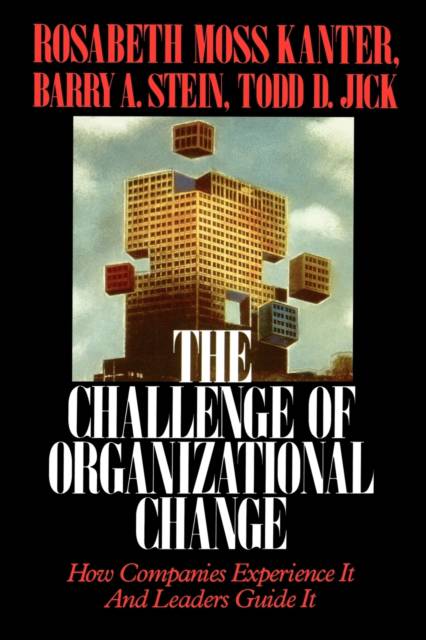
- Afhalen na 1 uur in een winkel met voorraad
- Gratis thuislevering in België vanaf € 30
- Ruim aanbod met 7 miljoen producten
- Afhalen na 1 uur in een winkel met voorraad
- Gratis thuislevering in België vanaf € 30
- Ruim aanbod met 7 miljoen producten
Zoeken
Challenge of Organizational Change
How Companies Experience It and Leaders Guide It
Rosabeth Moss Kanter
Paperback | Engels
€ 50,45
+ 100 punten
Omschrijving
In an era of increased global competition, of takeovers, downsizing, restructuring, and even outright failure, managing intelligent organizational change is the most difficult challenge facing business. Kanter, Stein, and Jick present here a comprehensive overview and an authoritative model for how to and, in some cases how not to, institute change in organizations.
Building upon their "Big Three" model of change, the authors focus on internal and external forces that set events in motion; the major kinds of change that correspond to external and internal change pressures; and the principal tasks involved in managing the change process. Several "portraits" of companies undergoing different types of change, coupled with the authors' own expert analyses, prove that no one person or group can make change "happen" alone. Instead, the authors assert that it is the delicate balance among key players that makes organizational change a success.
The authors analyze the forces for change by examining Banc One, Apple Computer, and Lehman Brothers, among others, to illustrate environmental and cyclical change as businesses grow. Then they turn to forms of change, drawing on the Western-Delta merger, strategy change at Bell Atlantic, and takeover turmoil at Lucky Stores, to show how companies change their structures and cultures. The section on execution of change shows "change masters," to use Kanter's own famous term, at work at Motorola, General Electric, and other leading firms, as well as the difficulties of implementing change at General Motors and Microswitch.
Fundamental organizational change, they argue, is exemplified by identity change, involving much more than the transfer of tangible assets. Managing the feelings, fears, and hopes of people must be the central strategy during such transitions. In this essential volume for managers and analysts of change, Kanter, Stein, and Jick offer powerful insights, practical new directions for action, prospects for the future of deliberate organizational change, and advice on where to begin the change process, and when: NOW!
Building upon their "Big Three" model of change, the authors focus on internal and external forces that set events in motion; the major kinds of change that correspond to external and internal change pressures; and the principal tasks involved in managing the change process. Several "portraits" of companies undergoing different types of change, coupled with the authors' own expert analyses, prove that no one person or group can make change "happen" alone. Instead, the authors assert that it is the delicate balance among key players that makes organizational change a success.
The authors analyze the forces for change by examining Banc One, Apple Computer, and Lehman Brothers, among others, to illustrate environmental and cyclical change as businesses grow. Then they turn to forms of change, drawing on the Western-Delta merger, strategy change at Bell Atlantic, and takeover turmoil at Lucky Stores, to show how companies change their structures and cultures. The section on execution of change shows "change masters," to use Kanter's own famous term, at work at Motorola, General Electric, and other leading firms, as well as the difficulties of implementing change at General Motors and Microswitch.
Fundamental organizational change, they argue, is exemplified by identity change, involving much more than the transfer of tangible assets. Managing the feelings, fears, and hopes of people must be the central strategy during such transitions. In this essential volume for managers and analysts of change, Kanter, Stein, and Jick offer powerful insights, practical new directions for action, prospects for the future of deliberate organizational change, and advice on where to begin the change process, and when: NOW!
Specificaties
Betrokkenen
- Auteur(s):
- Uitgeverij:
Inhoud
- Aantal bladzijden:
- 556
- Taal:
- Engels
Eigenschappen
- Productcode (EAN):
- 9780743254465
- Verschijningsdatum:
- 1/04/2003
- Uitvoering:
- Paperback
- Formaat:
- Trade paperback (VS)
- Afmetingen:
- 155 mm x 230 mm
- Gewicht:
- 789 g

Alleen bij Standaard Boekhandel
+ 100 punten op je klantenkaart van Standaard Boekhandel
Beoordelingen
We publiceren alleen reviews die voldoen aan de voorwaarden voor reviews. Bekijk onze voorwaarden voor reviews.







